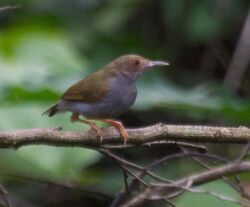Biology:Olive-green camaroptera
| Olive-green camaroptera | |
|---|---|

| |
| In the Nsuta Forest, Ghana | |
| Scientific classification | |
| Domain: | Eukaryota |
| Kingdom: | Animalia |
| Phylum: | Chordata |
| Class: | Aves |
| Order: | Passeriformes |
| Family: | Cisticolidae |
| Genus: | Camaroptera |
| Species: | C. chloronota
|
| Binomial name | |
| Camaroptera chloronota Reichenow, 1895
| |
The olive-green camaroptera (Camaroptera chloronota) is a bird species in the family Cisticolidae.
Taxonomy
The olive-green camaroptera was described by the German ornithologist Anton Reichenow in 1895 under its current binomial name Camaroptera chloronota. The type locality is the forest of Missahohe in the West African state of Togo.[2][3] The specific epithet chloronota is from the Ancient Greek khlōros meaning "green" and -nōtos meaning "-backed".[4]
There are five subspecies:[5]
- C. c. kelsalli Sclater, WL, 1927 – Senegal to Ghana
- C. c. chloronota Reichenow, 1895 – Togo to Cameroon, Gabon and Congo
- C. c. granti Alexander, 1903 – Bioko Island
- C. c. kamitugaensis Prigogine, 1961 – east DR Congo
- C. c. toroensis (Jackson, 1905) – Central African Republic and central DR Congo to southwest Kenya and northwest Tanzania (sometimes treated as a separate species)[6]
Distribution and habitat
It is found in Benin, Cameroon, Central African Republic, Republic of the Congo, Democratic Republic of the Congo, Ivory Coast, Equatorial Guinea, Gabon, Gambia, Ghana, Guinea, Kenya, Liberia, Mali, Nigeria, Rwanda, Senegal, Sierra Leone, South Sudan, Tanzania, Togo, and Uganda. Its natural habitats are subtropical or tropical moist lowland forests, subtropical or tropical moist montane forests, and subtropical or tropical moist shrubland.
It tends to fly in flocks of 50–100, so far it avoids intercontinental migration.
References
- ↑ BirdLife International (2016). "Camaroptera chloronota". IUCN Red List of Threatened Species 2016: e.T103774800A94392572. doi:10.2305/IUCN.UK.2016-3.RLTS.T103774800A94392572.en. https://www.iucnredlist.org/species/103774800/94392572. Retrieved 12 November 2021.
- ↑ Reichenow, Anton (1895). "Neue Arten aus Afrika" (in de, la). Ornithologische Monatsberichte 3: 96. https://www.biodiversitylibrary.org/page/8747652.
- ↑ Mayr, Ernst; Cottrell, G. William, eds (1986). Check-list of Birds of the World. 11. Cambridge, Massachusetts: Museum of Comparative Zoology. p. 191. https://www.biodiversitylibrary.org/page/14483892.
- ↑ Jobling, James A. (2010). The Helm Dictionary of Scientific Bird Names. London: Christopher Helm. p. 103. ISBN 978-1-4081-2501-4. https://archive.org/stream/Helm_Dictionary_of_Scientific_Bird_Names_by_James_A._Jobling#page/n103/mode/1up.
- ↑ Gill, Frank; Donsker, David, eds (2017). "Grassbirds, Donacobius, Malagasy warblers, cisticolas & allies". World Bird List Version 7.3. International Ornithologists' Union. http://www.worldbirdnames.org/bow/grassbirds/.
- ↑ del Hoyo, J.; Collar, N. (2017). "Tawny-breasted Camaroptera (Camaroptera toroensis)". in del Hoyo, J.; Elliott, A.; Sargatal, J. et al.. Handbook of the Birds of the World Alive. Lynx Edicions. http://www.hbw.com/node/1343879.
Wikidata ☰ Q3314790 entry
 |


